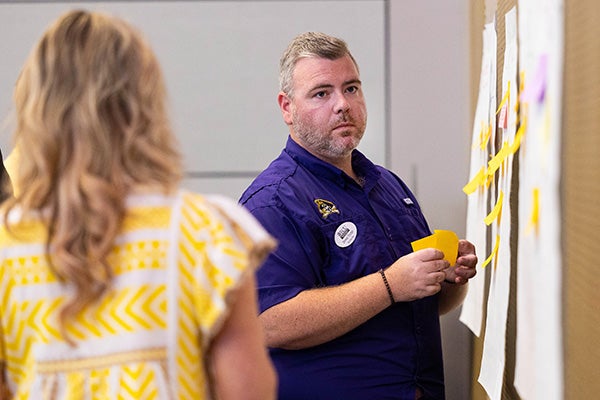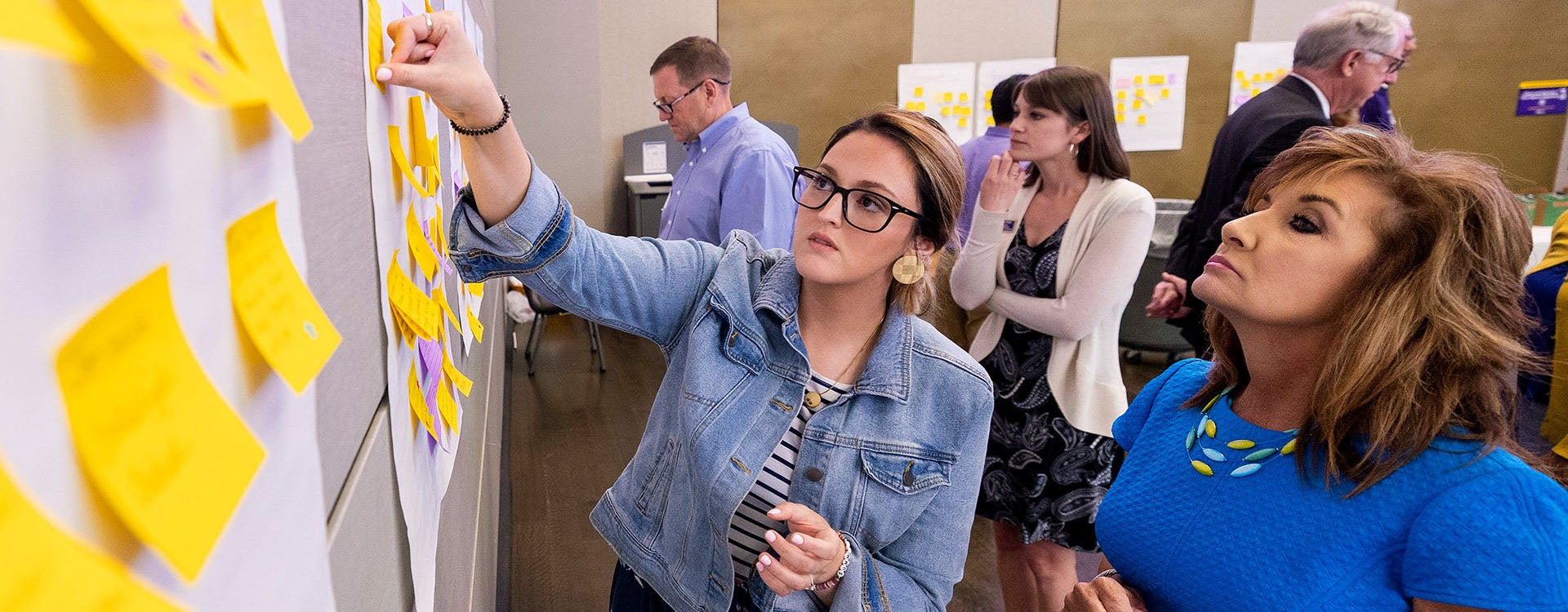Campus members learn, interact during resilience summit
A moment between East Carolina University Police Chief Jon Barnwell and Dr. Angela Lamson served as validation for organizers of the resilient campus summit led by the ECU College of Health and Human Performance.
Barnwell was honest about the limitations he had in his Wednesday schedule, and also honest about his enjoyment of the event.

Steven Trotter places a sticky note during a resilient campus summit activity at the Main Campus Student Center. (Photos by Rhett Butler)
“I was hesitant to block off half my day, but I’m really glad I did,” Barnwell said.
Lamson, a professor in human development and family science, responded by saying, ‘Thank you. That really warms my heart to hear that.’”
Lamson led the summit along with HHP colleagues Tamra Church, Dr. Erin Roberts and Dr. Jennifer Matthews.
The intent was to bring members from various parts of campus together to discuss stress and other challenges faced by students, staff, faculty and administrators. There also were virtual presentations by Becky Haas and Dr. Wally Dixon from the East Tennessee State University Ballad Health Strong Brain Institute on what has been successful there in resilient campus initiatives, productive environments for students and non-students, enrollment growth and improvements in leadership.
The ECU group then looked at research being conducted at ECU involving adverse childhood experiences (ACES) and positive childhood experiences (PCES) among students.
A hands-on and colorful activity was the interactive part of the day. Representatives were asked to write on purple and gold sticky notes what policies exist at ECU that align with a thriving campus, what concerns or challenges exist related to ACES and attrition, and what the university should or could consider or prioritize to face challenges and help with creating a more trauma-informed environment.
“We are upon a lot of opportunities to unify around some of the changes and challenges we are experiencing,” Lamson said. “We are one ECU. … We’re asking you to share (thoughts) with us, so we know what is happening on campus.”
Dr. Jason Yao represented the College of Engineering and Technology as the college’s associate dean for academic affairs. He said he left with some specifics he can share with faculty members.
“These mentor-related issues and how to support our students is of interest,” Yao said. “Being here and just to be able to listen to what these experts articulate, it’s something an engineer can not do. It was very informative and I learned a lot. … When experts do their research and have projects to show the importance of this, I’m just glad we can learn some more specifics and how to do it. We feel like we’ve affirmed we are on the right track, but also (the sticky note) activity was great to see all of this and hopefully it can help with the university to maybe set up some new things and overcome challenges.”
Matthews provided anecdotes about how students vary in their off-campus lifestyle, their upbringing and their stressors. The professor in health education and promotion, who is a leader of HHP’s Resilient Pirate Nation initiative, also discussed long-term topics related to retention and success for students and faculty.
“As an instructor, I have to be aware that all of the student experiences are coming in with them and affecting their learning,” Matthews said. “A lack of learning equates to, potentially, not having retention. We talk about recruiting and we want students to come here and great students to come here. I want to teach great students, but we also want to keep them. I would go a little further and say it’s the same thing for faculty.”

Melissa Watterson and Lynn Roeder participate in a brainstorming activity during the resilient campus summit at the Main Campus Student Center.